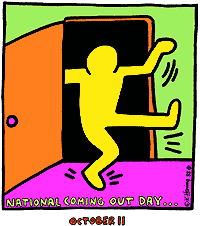Health
Why You Should Come Out For National Coming Out Day 10/11
Retired U.S. Rep. Barney Frank proves it's good for your health and career.
Posted October 10, 2017
Barney Frank’s personal journey toward coming out as a gay man is a fascinating story of how one gay man moved from living a kind of schizoid existence, separating his private identity as a gay man from his highly public work life, to a place of complete integration. As in so many of our stories, the moral of this one lies in the greatly increased personal happiness, professional success, and even improved health that followed Frank’s 1987 coming out. From then on, the now-retired Massachusetts congressman has lived completely openly—and is still widely considered the most prominent gay politician in the United States.
Being out as a gay man, and married to a supportive husband—Frank married Jim Ready on July 7, 2012—has been extremely good for Frank’s health and his career. “I eat to deal with stress and have a tendency to gain weight,” he told me in an interview. “When I first decided I could live as a gay man even without going out publicly, I began to exercise and lose weight. I think if I had remained closeted I would not have been in as good physical condition.”
National Coming Out Day, October 11, was founded in 1988 by New Mexico psychologist Robert Eichberg and New York lesbian activist Jean O’Leary, to mark the anniversary of the October 11, 1987, National March on Washington for Lesbian and Gay Rights. The two believed that instead of responding defensively to homophobia, a day to celebrate being gay was a far more powerful way to demonstrate that the personal truly is political.
Of course, any day someone chooses to embrace his or her “different” sexual orientation is a worthy coming out day. It also usually marks the beginning of greater personal and, often, political power as well.
Gregory M. Herek, a professor emeritus of psychology at the University of California at Davis, is an internationally recognized authority on prejudice against gay men and lesbians, hate crimes and anti-gay violence, and AIDS-related stigma. In an interview, he told me, “Certainly in the past, nearly everyone was brought up with the attitude that homosexuality was wrong, a sickness, a sin, and that anyone who was gay or lesbian was a bad person. Being raised in an environment where those ideas were ubiquitous, it’s almost inevitable that many people accepted or believed them.”
Fortunately, today fewer than ever accept or believe them. “What I think is amazing,” said Herek, “is how many people are doing fine and are mentally healthy, and leading whole and productive lives. How do they do it, given all they’re up against? How did they manage to come out of it? The answer is resilience. Once they’ve overcome their internalized self-stigma, they have more social and psychological resources for responding adaptively to other forms of stress.”
Fighting the stigma inside ourselves—self-stigma—is the challenge facing every gay man.
Ilan H. Meyer, coeditor with Mary E. Northridge of The Health of Sexual Minorities, is a Williams Distinguished Scholar of Public Policy at the Williams Institute for Sexual Orientation and Gender Identity Law and Public Policy at UCLA’s School of Law. His research as a social psychologist and psychiatric epidemiologist has focused on the public health aspects of sexual minority health. One of his studies, the NIH-funded Project Stride, explored the impact of social stresses on the mental health of those of us with “disadvantaged identities” related to gender, race/identity, or sexual orientation.
Meyer told me in an interview that even using the word resilience is new in connection with the LGBT population. In research, he explained, a person can be described as resilient only in the presence of stress, such as losing a job. “Coping” implies an effort in the face of stress, but isn’t necessarily positive or successful coping. How we cope with such traumas is what shows us to be resilient—or not. Drinking can be used to cope with stress, but no one would consider drinking oneself silly to be an effective way to cope with the situation. “Resilience implies you were successful in your effort,” said Meyer. “Resilience more directly indicates the outcome was positive.”
Although his gay and lesbian friends were “obviously delighted” when he came out, Barney Frank said that his straight friends “tried to dissuade” him. “My friends in the House who were the best advocates for gay rights wanted me not to come out, to live my life,” he said. “They said that if you come out, you will be marginalized.”
Frank told them he realized what they said could happen, but he didn’t want to live his life in the closet anymore. He said that, when he finally came out, “there was not as much of a negative as people were afraid of.” Not only that, but he said, “I had my liberal colleagues say to me, ‘We’re glad you did that because you’re better at your job.’ I was happier. I had a lot more emotional energy for the job—and the job takes a lot of that.”
Maybe the surest sign that Frank was a man changed by coming out and by love was what others said about him when he wasn’t present. “Later,” he told me, “when I was chair of the [House Financial Services] committee during the midst of the financial crisis, Jim repeated that he was frequently told they were glad he was here because Barney was easier to deal with.”





